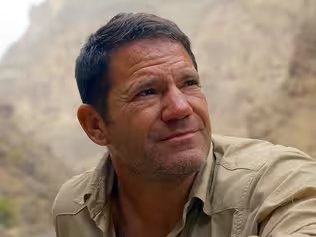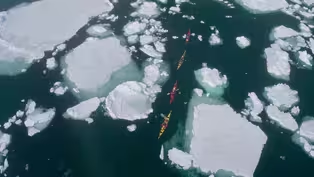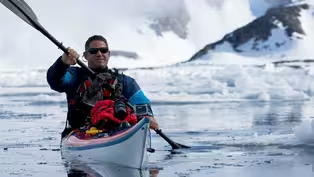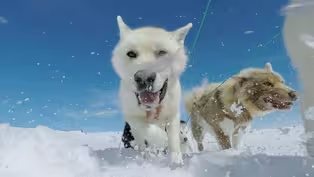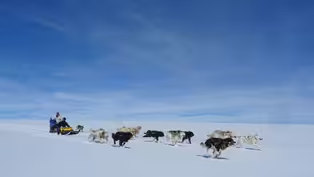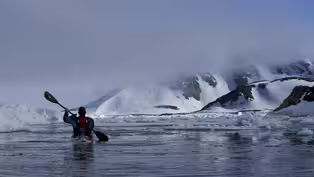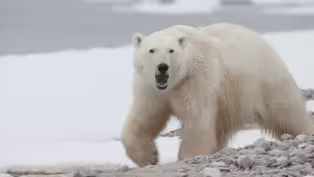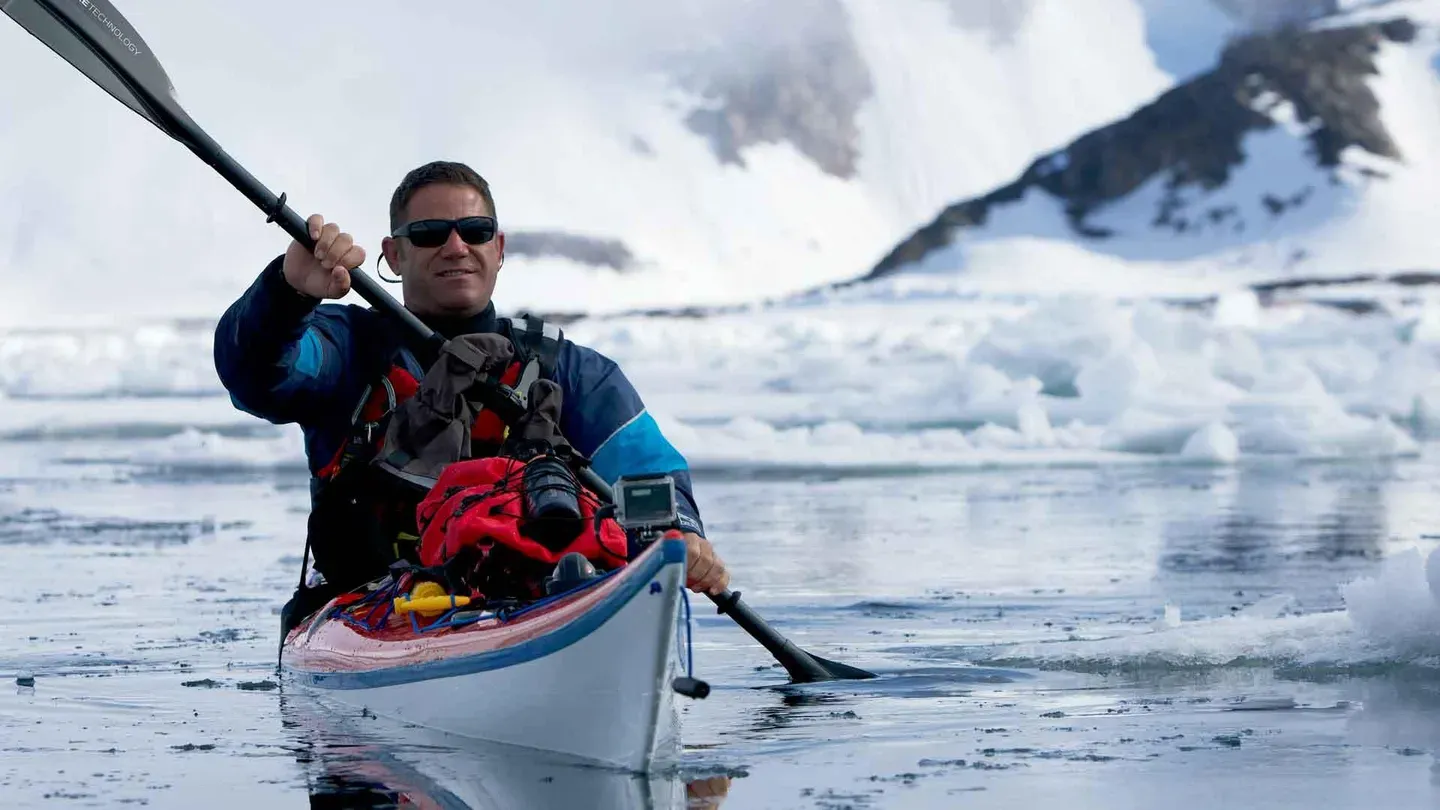

Greenland - Frozen Frontier
Season 1 Episode 2 | 50m 22sVideo has Closed Captions
Join Steve Backshall and explore the Arctic during its most volatile time of year.
Accompany Steve Backshall to Greenland, where he aims to kayak across the world’s largest fjord during the Arctic’s most volatile and dangerous time of year – the spring melt – in an attempt to understand how rising temperatures impact the area.
Problems playing video? | Closed Captioning Feedback
Problems playing video? | Closed Captioning Feedback

Greenland - Frozen Frontier
Season 1 Episode 2 | 50m 22sVideo has Closed Captions
Accompany Steve Backshall to Greenland, where he aims to kayak across the world’s largest fjord during the Arctic’s most volatile and dangerous time of year – the spring melt – in an attempt to understand how rising temperatures impact the area.
Problems playing video? | Closed Captioning Feedback
How to Watch Expedition
Expedition is available to stream on pbs.org and the free PBS App, available on iPhone, Apple TV, Android TV, Android smartphones, Amazon Fire TV, Amazon Fire Tablet, Roku, Samsung Smart TV, and Vizio.
Buy Now
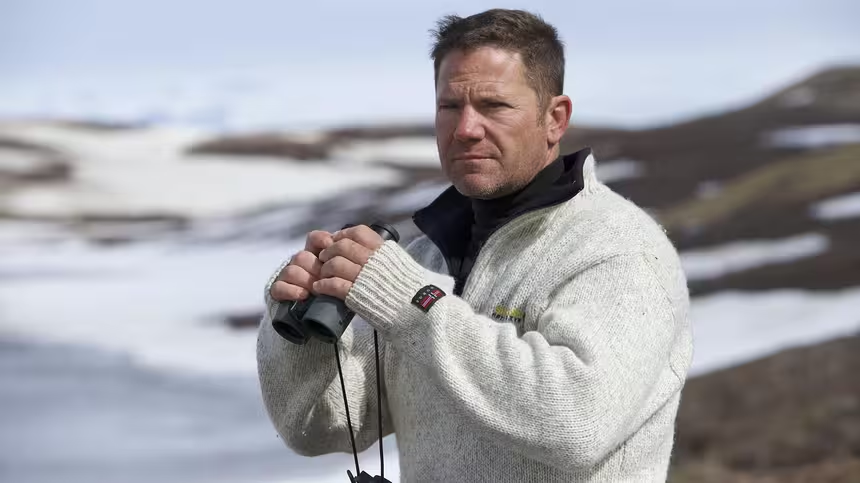
Meet Steve Backshall
Steve Backshall takes PBS behind his adventures, explains how the expeditions are chosen, and explores our role in protecting these magnificent locations.Providing Support for PBS.org
Learn Moreabout PBS online sponsorship[ethereal music] [loud bang, ice cracking] Oh, I don't like the look of this at all.
I'm Steve Backshall, a naturalist and explorer.
I'm in Greenland, one of the wildest and most remote countries on the planet.
And way up inside the Arctic Circle, this place is what adventures are made of.
But this is an environment in flux.
We're in very real danger of getting trapped here.
I'm attempting to kayak up th e largest fjord in the world, with an expert team of Arctic explorers.
[Aldo] We're going a long way the wrong way.
This gruelling expedition will push us to our physical limit... through treacherous waters, littered with unpredictable sea ice.
You just don't want to get caught in here, do you?
This is a pioneering journey... possible now for the first time in human history.
It's a journey that could shed light on our changing world.
-[men shouting] -Go on!
[banging and shouting] He looks like he's coming back.
[wind gusts] Greenland is a place of superlatives.
It's the world's largest island, the least populated country on Earth.
There is no ice cap bigger than the Greenland one outside of Antarctica.
I've come to a vast inlet on Greenland's remote east coast.
Carved by glaciers, it's known as a fjord.
It's littered with chunks of ice... broken remnants left behind as the solid winter sea ice melted and broke up.
Our kayak expedition will take us through this ever-shifting sea ice, until we reach the solid ice edge.
Something no one has ever attempted before.
[helicopter blades whirr] This expedition will take us right to the heart of one of the remotest and most inhospitable places on Earth.
I'm starting here at the only town on the fjord, Ittoqqortoormiit.
Home to fewer than 400 people, this is officially the most remote settlement in the western world.
And this is just the start of our journey.
Simply stunning.
Hello.
[giggling] This is a land of extremes.
In winter, temperatures are well below freezing.
And in summer, the sun doesn't se t for two months of the year.
To attempt an expedition in such extremes, I'm bringing together a world-class team of Arctic explorers.
Sarah McNair-Landry is a polar adventurer who's been to both poles and crossed the Greenland ice cap six times.
Personally, I'm really excited about this area, cos I've spent a lot of time in Greenland but mostly on the ice cap, kite-skiing and skiing.
And a lot of time on the west coast of Greenland, but this is a totally new area for me.
Martin Rickard has kayaked over 1,100 kilometres in sea ice.
His knowledge of safely navigating the Arctic is second to none.
It's managing the risk of the ice and the weather, and then the effect that the weather and the tide will have on that ice and how it can move very dramatically.
Block us off, trap boats.
It could blow us all out to sea quite quickly if weren't on our game.
So, it should be fun.
-What do you think of this then?
-Yeah!
Looks good.
The final member of the team to arrive is my good friend Aldo Kane.
Dude!
He's a former Royal Marine and will be our safety expert and medic.
[Aldo] This thing is wonderful.
I've never been to Greenland.
I've wanted to come here since I was, honestly, about that size.
We're bringing in camping kit and supplies, as well as our precious sea kayaks.
Actually, quite nervy moments.
That up there is the crutch of our whole expedition.
If they break, we're done.
I've chosen sea kayaks as our best option for travelling up the fjord.
They can be packed with kit and, most importantly, squeezed through the narrowest of gaps in the broken ice.
Yeah, first one.
They all look pretty good.
Yeah!
Nice.
[Sarah] Yeah, we have boats!
We're packing everything we need to survive for just over a week.
Easier said than done.
It's kind of like, you look at the volume of kit that's got to go in the boat.
You look at the space you've got and they don't corollate at all.
While the kayaks are being packed, Sarah and I are going to try and get a look at our route.
[dogs barking] We're taking the traditional Inuit mode of transport.
Local dog-sledder Aqqalu has offered to take us to a vantage point, where we hope to get a view over the fjord.
-Hello.
-Hi.
-Steve.
-Aqqalu.
Nice to meet you, Aqqalu.
-Sarah.
-Aqqalu.
[Sarah] Word used for "left" and "right"?
To turn... -Iju?
Iju, iju.
-Yes.
And... [laughter] The Inuit have used dogs to pull sleds for over 4,000 years.
These hardy animals made travel and hunting in the Arctic possible, allowing humans to make a home here.
We've popped up above the clouds.
It's what's known as an inversion, where the temperature gradient between up and down switches, so all the clouds form below you.
It's ridiculously beautiful.
But, actually, it's exactly what we didn't want, cos you can't see the sea at all.
-What do you reckon?
-Not much of a view up here.
-I mean... -It looks brilliant to me!
[they laugh] So out there is the sea and over there is where we're going.
Hidden beneath the clouds and stretching inland for over 300 kilometres is the longest fjord system on the planet.
Satellite images show that this year, the winter sea ice has broken up early than ever before.
To reach the solid ice, we will have to kayak over 70 kilometres through treacherous, ever-shifting ice.
I want to see first-hand how this early break-up is affecting the wildlife and the people.
For Aqqalu and for everyone who lives in Ittoqqortoormiit, the lack of ice is threatening their very way of life.
Is this the earliest break-up you've seen?
Yeah.
[Sarah] And how does that affect hunting?
Does it make it harder to come out here?
-Yeah.
Yeah.
-To hunt?
[Steve] So maybe ten years ago, our expedition would be impossible.
You'd not be able to kayak down into the fjord.
No.
And now, what do you think?
Back in Ittoqqortoormiit, and with the kayaks packed, we're ready to launch into the fjord.
Okay.
We've got so much gear that we need a front-loader to haul it down.
[Steve] After years of dreaming, months of planning, finally we have a chance to get on the water.
Right now, it's... 6:00am.
And we just have to pray that the wind and the weather stays with us.
We've tried to think through every eventuality.
It's always a bit of a concern what you do when you're out on the water and you need to, er... Well, you know...
So I've come up with a little system.
Which is this, which I'm going to strap to my leg.
What could possibly go wrong?
Oh, no!
It's got a massive hole in it!
All my grand plans and my pee bag has got a massive hole!
-Oh, thank goodness I found it.
-[laughter] [Aldo] I'm kind of a little bit gutted that you did find it.
We have three larger boats, which will carry the film crew and their equipment.
If these boats can't make it through the ice, we'll be on our own.
And on-board cameras will record our every move.
Today, we're aiming for an abandoned hunting settlement, 12 kilometres away, called Kap Hope.
Our local boat captain, Johan, thinks we can spend our first night there.
-[Martin] Happy?
Angel?
-[woman] Yup, got it.
[Martin] I'll bring up the rear, yeah.
[Steve] Best practice is for us to be quite close together, certainly within visual distance of each other at all times.
And if I'm getting too far ahead, then you guys need to shout me.
Kayaking is all about balance, keeping your weight central so as not to capsize, while driving the boat forwards with your paddle.
[loud bang, ice cracking] The air temperature is well below freezing and the sea is turning to ice around us.
[Steve] The second anyone capsizes, goes over, comes out of their boat, it's going to become a survival situation instantaneously.
This ice may look harmless.
But stealthily and menacingly, it moves.
Some chunks are larger than football fields and weigh thousands of tonnes.
Pushed by the wind and pulled by the ebb and flow of the tides, they could easily crush a kayak.
I don't think there's anywhere else on Earth where you feel quite so small, quite so vulnerable and quite so much like the environment is the master of you.
See, that's a classic example of what's closed up -since they've gone through.
-Yeah.
Sarah and I make it through, but just behind us the ice has already closed in.
-What's that?
-They're really stuck.
That's closed up already.
I don't know if you can push it out the way.
[Aldo] Trying.
[grunts] It just completely, uh, -closed up again.
-[Sarah] Yeah, I saw that.
[sighs] We've travelled just a few hundred metres from town and we're already getting a sense of how challenging this trip will be.
Are you guys all right behind me?
[Sarah hesitantly] Y-Yup.
That didn't sound very convinced.
[Sarah] These guys are just a little stuck over here.
Oh, okay.
Shall I wait?
[Sarah] Maybe just hold up for a sec.
Yeah.
[Aldo] It's amazing how quickly it sets in round about you.
[Sarah] I know, it moves.
Aldo's through, but Martin's not so lucky.
He needs to use his ice axe to drag himself, inch by inch.
That's why everyone needed an axe.
[Sarah] Yes.
The shifting ice stretches ahead as far as we can see.
We're hugging the shoreline where we can, but every paddle stroke is taking us further from help and deeper into the unknown.
After pushing through the ice for six hours, we've finally broken out into open water.
Yeah!
That's more like it!
But the satisfaction of clocking up some kilometres is tinged with a sense of unease.
[Steve] We were planning this expedition months ago and said to ourselves, "Well, our gamble is that because of climate change, the fjord is going to be open much earlier than it ever has been before in human history."
And we were right.
And while that's given us the opportunity to do something that no one's done before, it's not actually something that gives us great joy.
The melt is happening all around us.
Even the solid ice, which we're trying to reach, is melting further with every day that passes.
We're kayaking towards an ever-shifting goal.
[Aldo] Are your feet ice blocks?
[Steve] Absolutely frozen solid.
After ten hours of paddling, we've made it to Kap Hope.
Cold and exhausted, we head to the shore.
So eerie seeing a ghost town like that kind of looming out through the mist, isn't it?
[Aldo] Mmm.
[Sarah] I think it was an old community and now it's just hunting cabins.
This is us!
The last residents of this hunting community left 18 years ago, when the demand for seal skins fell away.
We need to find somewhere to spend the night.
[Aldo] Steve!
It looks like a bit of a bothy, doesn't it?
I kind of expect to see white tape in the shape of a person on the ground.
That's not the atmospheric hunting hut I was thinking of.
Wherever I lay my hat... [Steve] It's got a roof, it's got walls.
So, yeah, it's home.
At this time of year, the sun never sets.
But it's been a full day of paddling, and by nine o'clock, we're all in bed.
Today's paddle has the potential to test all of us to our limits.
We have a huge inlet to cross, ten kilometres wide and packed with slabs of broken ice.
We'll be paddling far from the safety of shore, and if the wind picks up, we could easily get pushed out to sea.
There is a big, thick layer of ice ahead of us, which looks quite intimidating and might be impenetrable.
But we just have to go and have a look, check it out up close and see if we can push through it.
Yesterday's paddle gave us a taste of how quickly the ice can move.
Today, venturing further from the coast, the winds and tides will be stronger.
[Sarah] If the wind picks up, this ice could start drifting really fast.
It could be drifting out faster than we can paddle back to shore.
This whole environment, even though it looks completely motionless, it's always changing, always moving, and you just never know what's going to happen next.
If this started to close in on you, you'd be in so much trouble.
We push on into thicker sea ice and the filming boats follow.
[Steve] Oh, oops!
Oh, this doesn't look good.
We can't go that way.
We'll have to turn around.
We're in very real danger of getting trapped here.
It's impossible to see past the ice.
We need to get out to scan for a way through.
It's risky.
The ice is unstable.
But we need to find the route ahead.
That does not look good.
It's a blank expanse of ice.
The only thing I can think of really is sending up the drone.
Just flying it good and high and using that as a way to try and spot the way.
With 100 metres of elevation, we can see there are water channels in the broken ice.
But we need to move quickly before they close up.
Everything here looks the exact same.
[Steve] Yeah, it's so easy to lose your bearings.
Which direction would you say we're heading right now?
I think we're, uh... heading out west and then...
But, ideally, we need to be cutting north-east, don't we?
[Steve] To get back to land, yeah, we do.
The shifting ice has forced us to paddle way off course.
We're now six kilometres from land and water channels are closing quicker than we can paddle through them.
It's already started to close in behind us.
[Steve] We need to get out of here as quick as we can.
I've pushed on ahead... but the ice has closed in all around me.
Oh, I don't like the look of this at all.
[Martin] Can you... Can you see, Steve, there?
[Aldo] Can you see Steve?
[Sarah] I can see his paddle.
I'm separated from the rest of the team.
There's just no way on.
Every single time I paddle, it turns into a blind alley and you're stuck.
And now I also have no way... How am I going to get back?
[Aldo] Steve is on the other side of this ice here.
But the general flow - it's all going that way.
That's 180 degrees from where we want to go.
We're going a long way the wrong way.
This isn't cool, is it?
As the hours have passed, the tide and wind have started to move the ice.
Our worst fears are becoming a reality.
We're being taken away from shore and out to sea.
We need to get back together and fi nd a way out of the ice, fast.
[Aldo] Do you guys want to try pushing through on your boat?
The filming boats have managed to stay with us and Johan, the driver, tries to fo rce a passage through the ice.
He manages to open a channel... and we're reunited.
You might want to have to power through these before they close.
Oh, I think I see open water!
Massive area of open water.
[Sarah] Yes!
We can see open sea ahead, which is good, but we're still a long ways off the coast.
We're about five kilometres from where we want to be.
But it's a nice sight to see the open ocean.
Open sea!
Is that ever a sight for sore eyes.
We're worn out after seven hours on the freezing water.
We need an easy landing spot so we can make camp for the night.
Whoa!
I think we're in luck, mate.
I think we are, too.
Look at that.
Right, this lead is taking us all the way in.
All that's missing is a red carpet.
-[Sarah] And the margarita.
-And the margarita.
Eventually.
This will be our first night under canvas and we won't have the safety of last night's hut.
We need to be vigilant.
Everyone keep their eyes open for bears.
Yeah.
Polar bears are a carnivore that will occasionally hunt down and kill humans.
As the sun skirts the horizon, we sleep in shifts... each of us taking turn to scan for the Arctic's top predator.
It's four in the morning and, uh, I'm taking my shift on bear watch.
The whole midnight sun thing could really mess with your mind.
The fact that for three months of the year, the sun never rises here and then through the spring and the summer it never sets.
It's bitterly cold.
[groans] So... Well, we haven't seen a bear yet.
But they're definitely out there and their sense of smell is extraordinary.
So our camp with the food will attract bears from miles and miles away.
The fact of the matter is, this is an animal that will attack and kill human beings.
Our bear deterrents - we have flares that we can fire at a bear, bear spray, which is a kind of paper spray, like mace.
If none of those work, then we have rifles.
You know, none of us even want to consider using one of those.
Let's just hope it doesn't come to that.
It's been a long night, but bear watch wasn't the only thing disturbing our sleep.
Good morning.
Thank you very much.
Was there a snorer in your tent last night?
-Snorer in my tent?
-Yes, I...
Someone got into your tent...
This is the one bonus that you have on expedition with me, is that I don't snore.
Although, you do.
I can categorically guarantee you were snoring last night.
-Was I?
-Yeah.
[laughs] It's quite funny actually.
We have between us all the most unusual array of different snores.
Like one tent, you'll hear what sounds like a wounded bison and in another one, there's kind of like an old-fashioned steam train.
And then from your tent, there's a kind of cute whistle.
It kinda goes... Zzzzz, whooo!
Zzzzz, whooo!
It's whistling through my beard, that's what it is.
[laughs] [men shouting] Hey!
Hey!
[Steve] It's wandering towards us!
You can see already that it's smelt us, because it's downwind of us.
It's lifting its head up, sniffing the air.
It's very, very aware that we're here.
Bears have been seen going in a dead straight line for 20 miles towards food that they can only have smelt.
Normally, I'd be excited to see a bear, but chances are, he'll be vi ewing us as a potential meal.
Aldo, make sure you've got the gun.
Just out and ready.
And you've got bear flares, haven't you?
We have to be really cautious.
If we come over to this side of camp, and if everyone comes in nice and close together.
That yawn there is directed at us.
That's a threat display.
Okay, he's getting quite close now.
From there, he could cover this distance in a matter of seconds.
[rifle cocking] Hear the guys cocking their weapons.
Hey!
Hey!
Haaah!
Go on!
We're in this polar bear's home and the very last thing we want to do is hurt him.
But we do need to scare him off.
[Sarah] Just wanna let the flare off?
-Yeah.
-Hah!
Hah!
[flare bangs] Good job!
We hope the bright light from these marine flares will drive him away.
[men shouting] -[Steve] Hey!
-[man] Hah!
Hah!
Hah!
Hey!
Hey!
[gunshot in the air, rifle cocks] [Aldo] Have we got another flare on?
[man shouts, flare bangs] [banging and shouting] We're trying absolutely everything.
Hah!
[flare bangs] Hah, hah, hah!
[beating and banging] [Steve] Yeah, I think, hopefully, that'll be enough to make him get on his way.
But you can see, he just was not frightened at all.
He could smell food and he just keep on coming.
Oh, it looks like he's coming back.
So, so far... all the things that we've used are non-lethal.
We're using flares, firing into the air.
But it's not having any effect.
He still keeps coming back.
-[banging and shouting] -Hey!
Go on!
As a last resort, we try a few well-placed stones.
They won't hurt him through his thick fur, but may put him off.
I know it seems crazy to be throwing stones at a bear, but it's for his safety as much as ours.
If he does decide to come for us, there's absolutely nothing else you can do but shoot it and, seriously, that is the last thing that any of us want.
You can see he's just keeping on coming.
[Steve] Go on!
[Sarah] Go on!
Nice shot!
Finally, it looks like he's decided to go.
[Sarah] He's in the water.
Yeah.
[Steve] Great.
Perfect.
Okay.
So that's exactly what we were hoping for.
He's gone into the water.
He's swimming around us.
He's finally decided it wasn't worth the confrontation.
But it is just pure and simple, down to the fact that right now food is so, so scarce.
Because the ice has broken up so quickly, there are no seals around.
We haven't seen a single seal since we've been out here paddling.
And he just has no option but to come and try out everything that could be food.
And it turned out that was us.
Thankfully, we and the bear are walking away unharmed from this encounter.
Polar bears rely on the sea ice to travel, hunt and breed.
They and everything else that lives here are feeling the effects of our changing climate.
Climate change up here is not something that you see on a graph or in stats and facts and figures.
It's in changes to every single day and, you know, the fact that since the last Ice Age, here at this time of year, this has just been a flat expanse of ice and now it's not.
Does it need to be any more definitive than that?
What do we have to do before humanity wakes up?
All right then?
[Sarah] The goal of this camping trip was always to get as far as we could up Scoresby Sound to where the ice meets the ocean.
So, back in our kayaks, there's big headwinds.
So it's going to be a tough day of paddling.
We're now 30 kilometres from where we started and there's still 40km to where we think the solid ice will be.
We kayak further and further.
You've just got to keep paddling.
We paddle... camp.
[sighs] Watch for bears, then sleep... eat and paddle some more.
It's our fourth day on the water and as we get further up the fjord and closer to the solid ice, we're finally starting to see more wildlife.
What is that little black dot there?
[Sarah] That's a seal.
It's the first we've spotted on our journey.
[Steve] That's all right, little fella.
That's all right.
Stay there.
Stay there.
At this size, it's very difficult to tell what species it is.
But by far the most numerous up here is the ringed seal.
And they're also the favourite food of the polar bear.
This one here could well - it's young enough that it could well still be being seen by its mother.
Oh, that is beyond cute.
Though this seal is on the shoreline, mother seals tend to give birth on solid ice.
This sighting could be a sign we're getting closer to the receding ice edge and journey's end.
Sixty kilometres from our launch point, we again make camp for the night.
[Steve] When you set up camp, first things you think about are water, where the toilets gonna be, shelter, warmth, food.
But fresh water is, generally speaking, right at the top of the list.
So having running water like this is a blessing.
Probably gonna warm up once we get in the water.
Today, we hope to reach the ice edge.
But ahead of us is open water.
-Sarah?
-Yeah!
We've been going an hour.
What say we, uh, stop and have a drink?
Sounds good.
Each day, we have to take on 6,0000 calories, fuelling our muscles and enabling our bodies to keep warm.
Mmm!
Are you checking how you look in the camera?
-No.
-Mm-hmm.
Um, this is us on a stop on day five.
And, uh, the wind has turned against us.
Pretty much been paddling for one hour and probably done about a kilometre, if that.
-Do you need your hand back so you can get into your cheese?
-No, I'm okay.
I can't believe you, uh, you stopped off -with a whole block of cheese.
-Do you want some?
-No!
-This is how Canadians travel.
That orange cheese always kinda scares me a bit.
Red Leicester?
That's the one.
Though you're quite happily battle a polar bear, but you're scared by cheese.
[laughter] God!
This far up the fjord, there's less broken ice blocking our way.
But the ice we do see is much, much bigger... towering icebergs, many of them over 100 metres high.
These are another sign that we're closing in on the solid ice edge.
They are absolutely monstrous.
Some of them, the size of towns, it looks like.
These icebergs broke away from gigantic glaciers at the end of fjord and have been trapped in solid ice over winter.
Now, they're freed as the ice thaws.
We can't resist a closer look.
Oh, my God, that is absolutely awe-inspiring!
-[Sarah] God, that's pretty.
-Can you paddle this way, Sarah?
-[Aldo] Yeah.
-[Sarah] Yep.
[Steve] Whoooa!
Oh, my goodness!
That is absolutely incredible.
But beautiful as it is, it's a potentially lethal place.
We want to minimise our time here as much as we possibly can, because any part of this could break, crack and fall off.
It could even roll and... Well, you would not want to be anywhere near it when that happened.
This ice could have originally frozen 100,000 years ago, when Neanderthals still walked the Earth.
[Sarah] This part of it's pretty beautiful, too.
[Steve] Whoa!
Look at that!
That is immense!
Don't get too close, Sarah!
The wind really pushes you in.
[Steve] Just see all these daggers aimed at your head!
[laughs] God, that would hurt.
It's a scary thought as well to think how much is underneath us.
What is it?
Roughly a quarter above the water?
[Steve] Yeah.
So what you're saying is that really that's just the tip of the iceberg.
[Steve] Whey!
Leaving the iceberg behind, we spot what looks like a white line extending from one side of the fjord to the other.
What do you think, guys?
I think this is our big white wall.
To get here, we've navigated shifting ice, freezing conditions and a hungry polar bear.
Nearly there.
Finally, it looks like we've made it.
[Steve] Go on, Sarah!
You can do it!
[Sarah] Whoo-hoo-hoo!
This is the ever-receding barrier of ice we set out to reach.
We can paddle no further.
Are you standing on it, Sarah?
[Sarah] Uh, just one foot.
[Steve laughs] [Steve] Yo-ho-ho!
Look at that!
[Sarah] Solid.
Well, I'm still a little bit nervous.
Ha-ha!
Great job.
Well done.
Well done.
Awesome.
-Well done, Aldy.
-Big smile... [muffled] As a team, we've completed the earliest recorded kayak expedition up the largest fjord in the world.
[Sarah] There's something special being at this point where the ice meets the water, and especially at this time of year, where it's changing and the conditions are so dynamic.
[Aldo] This is the biggest fjord on the planet.
You know, to paddle up this at this time of year, it is genuinely a privilege.
But having said that, it's also quite sad.
This time of year, this is the earliest that the sea ice has broken up, on record.
Bar none.
And that is, very definitely, you know, a signal that the planet is changing.
[Steve] I think it would be an absolute tragedy if my generation were to be remembered as the people that wrecked the planet and did nothing about it.
I want to be known as the generation that stood up for the things that we believed in, that took charge of our problems and then tried to solve them.
This is somewhere where climate change, you know, is changing everything.
Now, not in 100 years' time.
And unless people switch on to that, the impacts are going to be felt everywhere.
♪ EXPEDITION WITH STEVE BACKSHALL IS AVAILABLE ON AMAZON PRIME VIDEO ♪ ♪
Video has Closed Captions
Clip: S1 Ep2 | 2m 58s | The team goes over safety for their trip along the longest fjord system on the planet. (2m 58s)
Episode 2 Preview | Greenland - Frozen Frontier
Video has Closed Captions
Preview: S1 Ep2 | 30s | Join Steve Backshall and explore the Arctic during its most volatile time of year. (30s)
Video has Closed Captions
Clip: S1 Ep2 | 4m 36s | To get a view of the fjord from above the team relies on a very special mode of transport. (4m 36s)
Video has Closed Captions
Clip: S1 Ep2 | 2m 45s | Aldo packs the kayaks while Steve attempts to get a better look at the fjord conditions. (2m 45s)
Video has Closed Captions
Clip: S1 Ep2 | 1m 14s | After kayaking the fjord for an hour, Steve, Aldo and Sarah stop to eat and hydrate. (1m 14s)
Video has Closed Captions
Clip: S1 Ep2 | 3m | The crew spots a lone polar bear wandering toward their camp in search of food. (3m)
Providing Support for PBS.org
Learn Moreabout PBS online sponsorshipSupport for PBS provided by:
